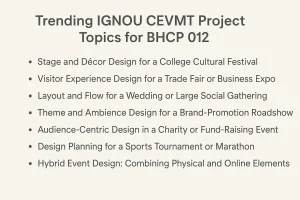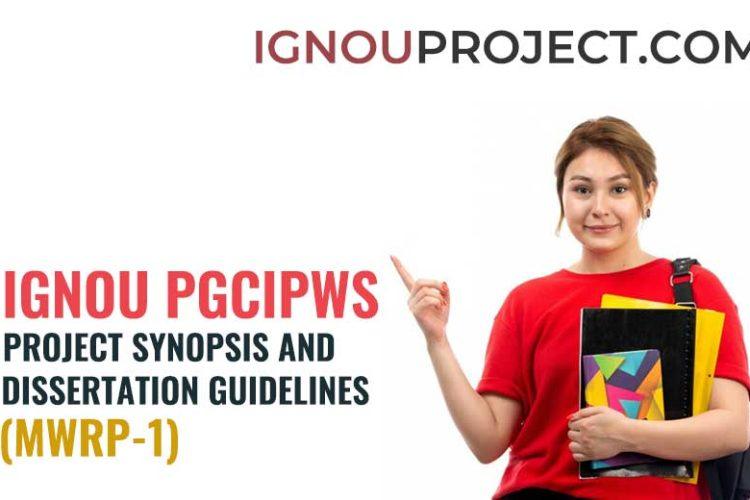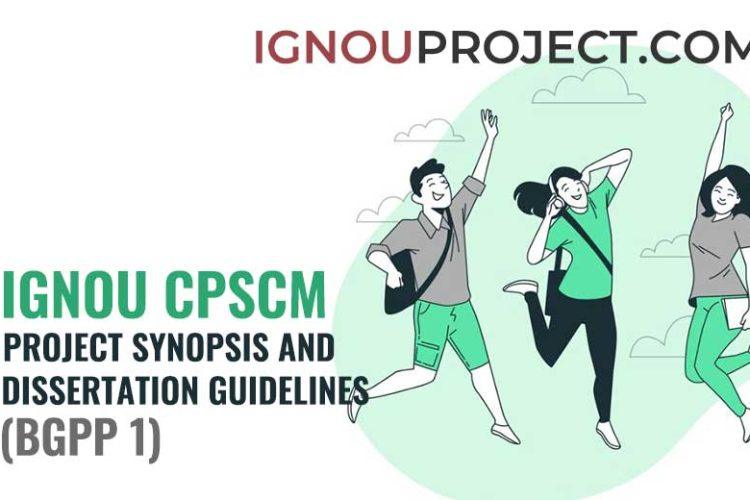
The Certificate in Event Management (CEVMT) is a short, focused programme that trains learners for entry-level roles in the event industry. It carries 20 credits and includes theory courses on basics, planning, coordination, communication, and one practical project. The practical part is the IGNOU CEVMT Project for BHCP 012, titled “Project in Event Design”. This project helps learners study a real event and understand how design decisions shape the audience’s experience and meet client needs.
The IGNOU CEVMT Project for BHCP 012 (Certificate in Event Management) is an important component that gives students practical experience in event management. This project attempts to improve students’ ability to plan, organize, and execute events effectively. It requires students to apply theoretical principles learned in the course to real-world settings.
The IGNOU CEVMT Project focuses on major components of event management, such as budgeting, marketing, logistics, risk management, and client relations. Students are usually expected to choose a certain event type, such as business events, weddings, exhibits, or cultural activities. The project includes creating a detailed report outlining the event’s goals, target audience, venue selection, resource allocation, timeframe, and contingency plans.
Students must also include practical factors such as vendor cooperation, promotional methods, and assessment approaches to ensure event success. The project is evaluated on the basis of its innovation, viability, and compliance with industry norms.
BHCP 012 Code Clarification within the CEVMT Programme
The course codes in the CEVMT structure are:
- BHC-011 – Basics of Event Management
- BHC-012 – Event Planning
- BHC-013 – Event Coordination and Control
- BCOLA-138 – Business Communication
- BHCP-012 – Project in Event Design (project, 2 credits)
Key points about BHCP-012:
- It is the only project course in the certificate.
- It carries 2 credits, so it has a clear weight in the overall grade.
- It focuses on observing and analysing the design of an event, not on running a full company by oneself.
Learners often mix BHC-012 (Event Planning, a theory course) with BHCP-012 (Project in Event Design). BHC-012 teaches planning ideas, while BHCP-012 asks the learner to apply those ideas to a real or planned event through a formal project report.
Core Guidelines for the IGNOU CEVMT Project for BHCP 012
Although exact rules are issued in the official project handbook, the project for BHCP-012 usually follows these broad academic expectations:
- Work must be original
- The project should reflect the learner’s own study and field work.
- Copying from ready-made reports can lead to rejection.
- Event-focused and design-centric
- The project should centre on event design: theme, layout, stage, seating, lights, sound, décor, audience flow, and branding.
- Based on a real event or a detailed plan
- The learner usually attends or closely studies one real event.
- If that is not possible, a detailed hypothetical event plan can be prepared with clear, realistic details.
- Structured study
- The project should show clear objectives, data collection, analysis, and findings.
- Simple charts, tables, and images may support the analysis.
- Academic writing standards
- Use clear, formal language and consistent formatting.
- Avoid very casual style and personal opinions without support.
Learners should always cross-check with the latest programme guide and any instructions shared by their study centre.
Choosing a Suitable Topic for IGNOU CEVMT Project (BHCP 012)
Choosing a suitable topic for your IGNOU CEVMT Project is crucial for ensuring a smooth research process and achieving good results. Here are some practical steps to help you select the right topic:
When selecting a topic for the IGNOU CEVMT Project for BHCP 012, the learner should ensure that:
- The event is clearly defined (type, size, and target audience).
- The focus stays on design aspects, not only on finance or promotion.
- Sufficient data can be collected (photos, layouts, interviews, feedback).
- The topic can be completed within the programme’s time limit (minimum 6 months and maximum 2 years).
Sample IGNOU CEVMT Project Topic Ideas in BHCP 012
Below are sample themes that fit the course focus on event design:
- Stage and décor design for a college cultural festival
- Visitor experience design for a trade fair or business expo
- Layout and flow for a wedding or large social gathering
- Theme and ambience design for a brand-promotion roadshow
- Audience-centric design in a charity or fund-raising event
- Design planning for a sports tournament or marathon
- Hybrid event design: combining physical and online elements
- Impact of Deforestation on Biodiversity in Indian Forest Reserves
- Role of Community-Based Conservation in Protecting Endangered Species
- Evaluation of Soil Erosion Control Techniques in Agricultural Areas
- Assessing the Impact of Climate Change on Himalayan Ecosystems
- Mitigation Strategies for Reducing Carbon Emissions in Urban Cities
- Role of Renewable Energy in Combating Global Warming

Image: Trending IGNOU CEVMT Project Topics for BHCP 012
Synopsis Structure for BHCP 012 (Project in Event Design)
A brief synopsis for the BHCP 012 project in the CEVMT programme should cover:
- Project Title
- Short and specific, focused on event design.
- Example: “Design Study of ABC College Fest 2025”.
- Background and Rationale
- Short note on the event type and why its design is worth studying.
- Mention key design issues such as theme, crowd flow, branding, or ambience.
- Objectives
- Usually 3–5 clear objectives, for example:
- To study the layout and décor plan of the event.
- To assess how design affects comfort and experience.
- To suggest improvements for future editions.
- Usually 3–5 clear objectives, for example:
- Scope and Limitations
- What the project will cover (stage, seating, signage, lighting, entry–exit, etc.).
- What it will not cover (for example, ticket pricing or detailed legal aspects).
- Method of Study
- Direct observation during the event.
- Short interviews with organisers, vendors, or participants.
- Review of event plans, checklists, floor plans, or photos.
- Expected Outcomes
- Better understanding of how event design choices work in practice.
- Practical suggestions to improve design in future events.
- Time Plan
- Simple schedule for approval, data collection, analysis, and report writing.
Suggested CEVMT Project Report Format for BHCP 012
Front Part
- Title page with programme, course code, project title, learner and guide details
- Learner’s declaration of originality
- Guide’s certificate (if required)
- Short acknowledgement
- Table of contents and lists of tables/figures (if used)
Chapter 1 – Introduction
- Short overview of the event industry and the chosen event type
- Details of the specific event (name, date, place, organiser, audience)
- Need for the study and link with event design
- Problem statement, objectives, scope, and limitations
Chapter 2 – Basic Concepts of Event Design
- Simple explanation of theme, ambience, branding, layout, crowd flow, and experience design
- Link between planning, coordination, and design decisions
Chapter 3 – Event Profile and Methodology
- Detailed description of the event plan and structure
- Stakeholders: organisers, sponsors, vendors, audience
- Methods used: observation, interviews, feedback forms, photos
- Tools for organising data: checklists, rating scales, simple tables
Chapter 4 – Analysis of Event Design
- Study of entrance, registration, main arena, stage, seating, food area, and exits
- Use of colour, lighting, sound, décor, and branding material
- Placement of signage and digital displays
- Strengths and weaknesses in each area, with tables or simple layouts where useful
Chapter 5 – Findings, Suggestions, and Conclusion
- Key findings linked to each objective
- Clear, realistic suggestions to improve future design
- Overall conclusion connecting the study to learning from the programme
End Part
- Bibliography (if any external material is used)
- Annexures: questionnaires, interview guides, layouts, photos (if allowed)
Guide / Supervisor Selection for CEVMT (BHCP 012) Project
- Usually a faculty member in event management, hospitality, tourism, or business.
- A senior industry professional in events or event design may be accepted if approved.
- The guide should hold a relevant qualification and have practical event experience.
- Final approval of the guide is normally given by the concerned centre, and the learner should keep proof of that approval.
IGNOU CEVMT (BHCP 012) Project Submission Process
- Topic and Synopsis Approval
- Choose a design-focused topic, prepare the synopsis, and get it checked by the guide.
- Submit the synopsis as per current instructions and obtain formal approval.
- Field Work and Data Collection
- Observe the event, take notes and photos, and conduct short interviews.
- Keep data organised and clear.
- Analysis and Report Writing
- Arrange observations under headings from the approved structure.
- Prepare tables and simple layouts where they add clarity.
- Check the report for language, formatting, and completeness.
- Guide Certification
- Incorporate guide feedback.
- Get the guide’s signature on the certificate page.
- Final Binding and Submission
- Print, bind, and label the report as instructed.
- Submit to the designated office or centre before the last date for the chosen term-end session.
FAQs on IGNOU CEVMT Project for BHCP 012
What is BHCP 012 in the CEVMT programme?
BHCP-012 is the Project in Event Design, a 2-credit practical course in the Certificate in Event Management.
Can a learner choose a hypothetical event for the project?
Yes, but the event design must be detailed and realistic. Real events are usually better because they allow richer data.
Can the project be done in a group?
Unless the centre clearly allows group work, it is safer to treat BHCP-012 as an individual project.
Who approves the CEVMT project guide?
The proposed guide is generally approved by the study centre or regional centre as per current rules.
Downloadable Resources
Conclusion
The IGNOU CEVMT Project for BHCP 012 gives learners a rare chance to move from theory to practice. Through this project, the learner studies event design at close range, links design choices to audience experience, and develops the skills needed in today’s event industry.
A well-planned topic, a clear synopsis, a structured report, and guidance from an eligible supervisor together create a strong project that supports both academic success and career growth in event management.
For structured help with topic selection, synopsis drafting, project report support, and formatting for the IGNOU CEVMT Project for BHCP 012, learners can reach out to ignouproject.com or contact us for specialised guidance and services.

